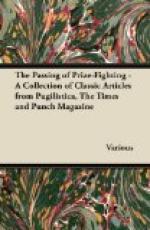Man is the only animal that cooks his dinner before he eats it. All other species of the same genus are content to take the provisions of nature as they find them; but man’s reason has designed pots and roasting-jacks, stewpans and bakers’ ovens; thus opening a wide field for the exercise of that culinary ingenuity which has rendered the names of Glasse and Kitchiner immortal. Of such importance is the gastronomic art to the well-being of England, that we question much if the “wooden walls,” which have been the theme of many a song, afford her the same protection as her dinners. The ancients sought, by the distribution of crowns and flowers, to stimulate the enterprising and reward the successful; but England, despising such empty honours and distinctions, tempts the diffident with a haunch of venison, and rewards the daring with real turtle.
If charity seeks the aid of the benevolent, she no longer trusts to the magic of oratory to “melt the tender soul to pity,” and untie the purse-strings; but, grown wise by experience, she sends in her card in the shape of “a guinea ticket, bottle of wine included;” and thus appeals, if not to the heart, at least to its next-door neighbour—the stomach.
The hero is no longer conducted to the temple of Victory amid the shouts of his grateful and admiring countrymen, but to the Freemason’s, the Crown and Anchor, or the Town Hall, there to have his plate heaped with the choicest viands, his glass tilled from the best bins, and “his health drank with three times three, and a little one in.”
The bard has now to experience “the happiest moment of his life” amid the jingling of glasses, the rattle of dessert plates, and the stentorian vociferations of the toast-master to “charge your glasses, gentlemen—Mr. Dionysius Dactyl, the ornament of the age, with nine times nine,” and to pour out the flood of his poetic gratitude, with half a glass of port in one hand and a table-napkin in the other.
The Cicero who has persuaded an enlightened body of electors to receive L10,000 decimated amongst them, and has in return the honour of sleeping in “St. Stephen’s,” and smoking in “Bellamy’s,” or, to be less figurative, who has been returned as their representative in Parliament, receives the foretaste of his importance in a “public dinner,” which commemorates his election; or should he desire to express “the deep sense of his gratitude,” like Lord Mahon at Hertford, he cannot better prove his sincerity than by the liberal distribution of invitations for the unrestrained consumption of mutton, and the unlimited imbibition of “foreign wines and spirituous liquors.”




